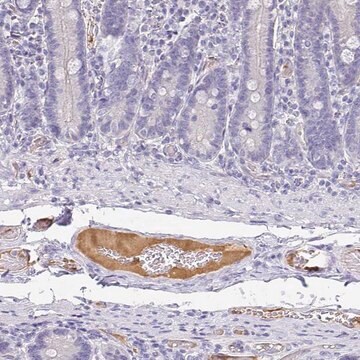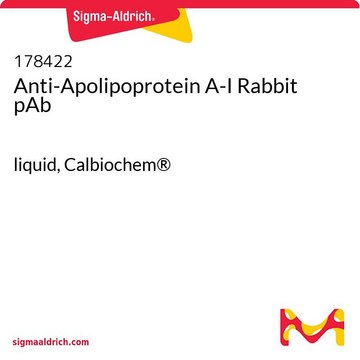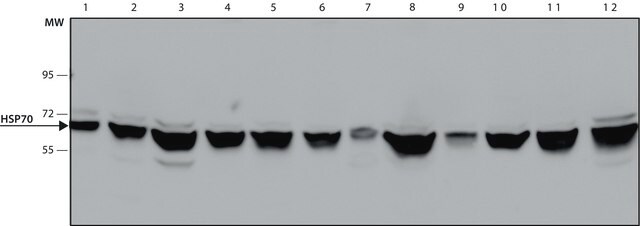추천 제품
생물학적 소스
mouse
Quality Level
항체 형태
purified immunoglobulin
항체 생산 유형
primary antibodies
클론
2G11, monoclonal
종 반응성
hamster, mouse, rat
반응하면 안 됨
human
포장
antibody small pack of 25 μg
기술
ELISA: suitable
western blot: suitable
동형
IgG1κ
NCBI 수납 번호
UniProt 수납 번호
배송 상태
ambient
타겟 번역 후 변형
unmodified
유전자 정보
mouse ... Apob(238055)
일반 설명
Apolipoprotein B-100 (UniProt: E9Q414; also known as Apo B-100) is encoded by the Apob gene (Gene ID: 238055) in murine species. Apolipoprotein B is a major protein constituent of chylomicrons. Apo B particles are made up of lipids and proteins and each Apo B is bordered by a phospholipid monolayer with an inner core composed of variable amounts of triglycerides and cholesterol esters. Apo B is synthesized with a signal peptide (aa 1-27) that is subsequently cleaved off. Two isoforms of Apo B are produced- Apo B-100 is synthesized in the liver and Apo B-48 is produced in the intestine. Apo B-100 contains the region that binds to the LDL receptor. It contains VLDL particles, VLDL remnant particles and LDL particles. On the other hand, the Apo B-48 particles are made of chylomicrons and chylomicron remnant particles. Generally, LDL particles account for approximately 90% of Apo B particles in plasma. Abnormal trapping of an Apo B is a major factor in the development of atherosclerotic lesions. When Apo B particles degrade cholesterol is retained with macrophages that induce inflammatory response. Further entry and entrapment of Apo B can promote cardiovascular pathology over time. (Ref.: Sniderman, A et al. (2010). Nat. Rev. Endocrinol. 6(6); 335-346).
특이성
Clone 2G11 detects Apolipoprotein B in Mouse, Rat, and Hamster plasma and tissues. It binds to ApoB-48 and ApoB-100, but not to ApoB-39.
면역원
ApoB-containing lipoproteins isolated from Apoe -/- Apob 48/48 mice.
애플리케이션
Detects Apolipoprotein B using this mouse monoclonal Anti-ApoB, clone 2G11 , Cat. No. MABS2046, is a mouse monoclonal antibody that detects Apolipoprotein B in Mouse, Rat, and Hamster and is tested for use in ELISA and Western Blotting.
Research Category
Signaling
Signaling
Western Blotting Analysis: 4 µg/mL from a representative lot detected ApoB in 10 µg of rat liver and mouse liver tissue lysate.
Western Blotting Analysis: A representative lot detected ApoB in Western Blotting applications (Nguyen, A.T., et. al. (2006). Biochem Biophys Acta. 1761(2):182-5; Cheng, D., et. al. (2016). J Biol Chem. 291(45):23793-23803).
ELISA Analysis: A representative lot detected ApoB in ELISA applications (Nguyen, A.T., et. al. (2006). Biochem Biophys Acta. 1761(2):182-5).
Western Blotting Analysis: A representative lot detected ApoB in Western Blotting applications (Nguyen, A.T., et. al. (2006). Biochem Biophys Acta. 1761(2):182-5; Cheng, D., et. al. (2016). J Biol Chem. 291(45):23793-23803).
ELISA Analysis: A representative lot detected ApoB in ELISA applications (Nguyen, A.T., et. al. (2006). Biochem Biophys Acta. 1761(2):182-5).
품질
Evaluated by Western Blotting in rat serum.
Western Blotting Analysis: 4 µg/mL of this antibody detected ApoB in 10 µg of rat serum.
Western Blotting Analysis: 4 µg/mL of this antibody detected ApoB in 10 µg of rat serum.
표적 설명
~260 kDa observed; 509.43 kDa calculated. Uncharacterized bands may be observed in some lysate(s).
물리적 형태
Format: Purified
Protein G purified
Purified mouse monoclonal antibody IgG1 in buffer containing 0.1 M Tris-Glycine (pH 7.4), 150 mM NaCl with 0.05% sodium azide.
저장 및 안정성
Stable for 1 year at 2-8°C from date of receipt.
기타 정보
Concentration: Please refer to lot specific datasheet.
면책조항
Unless otherwise stated in our catalog or other company documentation accompanying the product(s), our products are intended for research use only and are not to be used for any other purpose, which includes but is not limited to, unauthorized commercial uses, in vitro diagnostic uses, ex vivo or in vivo therapeutic uses or any type of consumption or application to humans or animals.
적합한 제품을 찾을 수 없으신가요?
당사의 제품 선택기 도구.을(를) 시도해 보세요.
Storage Class Code
12 - Non Combustible Liquids
WGK
WGK 1
Flash Point (°F)
does not flash
Flash Point (°C)
does not flash
시험 성적서(COA)
제품의 로트/배치 번호를 입력하여 시험 성적서(COA)을 검색하십시오. 로트 및 배치 번호는 제품 라벨에 있는 ‘로트’ 또는 ‘배치’라는 용어 뒤에서 찾을 수 있습니다.
Zsófia Onódi et al.
Frontiers in physiology, 9, 1479-1479 (2018-11-09)
Background: Extracellular vesicles (EVs) (isolated from blood plasma) are currently being extensively researched, both as biomarkers and for their therapeutic possibilities. One challenging aspect to this research is the efficient isolation of high-purity EVs from blood plasma in quantities sufficient
Masanori Fukushima et al.
The Journal of biological chemistry, 293(39), 15277-15289 (2018-08-25)
Extracellular vesicles are important carriers of cellular materials and have critical roles in cell-to-cell communication in both health and disease. Ceramides are implicated in extracellular vesicle biogenesis, yet the cellular machinery that mediates the formation of ceramide-enriched extracellular vesicles remains
자사의 과학자팀은 생명 과학, 재료 과학, 화학 합성, 크로마토그래피, 분석 및 기타 많은 영역을 포함한 모든 과학 분야에 경험이 있습니다..
고객지원팀으로 연락바랍니다.








